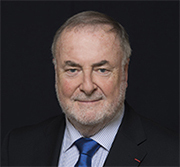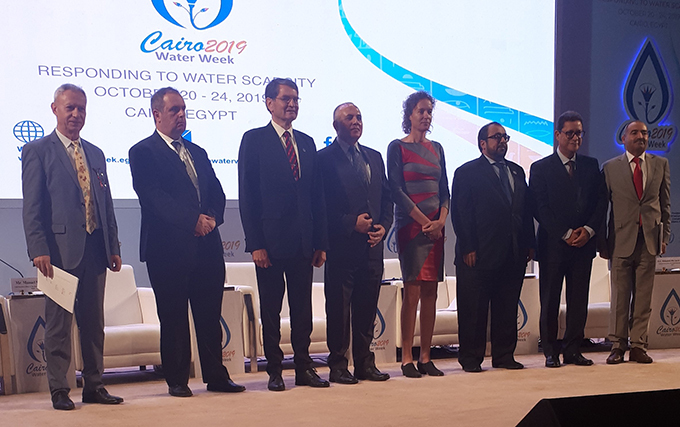Lets collaborate on access to water for all
Nov 04, 2019
This is the edited speech Loic Fauchon, the President of the World Water Council during the opening session on October 20, 2019

October 20 - 24, 2019 was the Second Cairo Water Week. It was organised by the Ministry of Water Resources and Irrigation, representing the Government of Egypt, under the auspices of President Abdel Fatah El-Sisi, President of the Arab Republic of Egypt. The first conference was held in October 2018. The week's activities were held at the Al-Manara Conference Centre under the Theme: Responding to Water Scarcity. Uganda was represented by Jackson Twinomujuni, the Commissioner International and Transboundary Water Affairs at the Ministry of Water and Environment. The second delegate from Uganda was Sowed Sewagudde of the Directorate of Water Resources Management at the Ministry of Water and Environment, who presented a paper on The Ugandan measures for Climate Change adaptation in the water sector.
Below is the edited speech Loic Fauchon, the President of the World Water Council during the opening session on October 20, 2019.

Dear Friends of Water,
The World Water Council is, by my voice, happy and honoured to participate in the 2nd International Cairo Water Week.
And in the name of all World Water Council members, I would like to address my warm thanks to the Egyptian Government for this initiative and the invitation to contribute to the process of seeking new solutions for water challenges.
We must all remember that it is on the Nile River and around the Mediterranean shores that the World Water Council was born 25 years ago, due to the vision of my friend Dr Mahmud Abu Zeid to whom, in front of you all, I would like to address my deepest feelings of respect and consideration.
Ladies and Gentlemen,
In History and before, the world has been suffering from multiple crises and our contemporary period does not escape the rule.
Diplomatic and military crises - unfortunately numerous in this region, economic and monetary crises, climate and environmental crises and so many others. And of course, and you know it, there are many tensions
related to water and energy.
Yes, my dear friends, the earth is thirsty and consequently, the mankind is hungry.
And more precisely, there is a big region from the Atlantic Ocean to the Indian sub-continent passing through the Horn of Africa which is a real "triangle of thirst" with more than two billion thirsty inhabitants.
Water is scarce in this region and populations suffer from violent water stresses which are worsening year after year.
However, since the beginning of times, water is around us, water stimulates us and is the gathering link to feed our bodies and fertilise the earth.
But the original water has been progressively ill-treated and misused by mankind.
Because human communities have been careless and short-sighted. Why so much inconsistency and carelessness? For two main reasons:
First, because of an ever-growing demography which is still irresistible. With the absurd consequence of galloping mega-cities that create new poverty centres in slums and informal settlements. You can be sure that megacities are the real "monsters" of modern times. And their situation along big rivers and sea shores makes it worse.
The second reason is because of too much water waste in too many places. In conjunction with enormous pollutions, which are harmful for the quality of water.
We have to change our individual behaviours and our public policies in order to stop the spoliation of water resources, we will lead billions of children, women and men to the path of a great distress.
And in addition to all this, step by step, climate evolution is appearing, even if we do not exactly know yet all the possible effects.
Climate is what His Majesty Mohammed VI, King of Morocco calls " the ultimate injustice made to the most vulnerable".
The main consequence is that, in spite of all our efforts, water demand is growing faster than water offer.
In these conditions, dear friends of water, what can we do to guarantee to all human beings the right to access to water and sanitation?
 Discussants during the opening session of the 2nd Cairo Water Week.
Discussants during the opening session of the 2nd Cairo Water Week.
The right to water is an easy concept to formulate but it is so complex to implement.
The right to water is a very strongly linked with our major concern which is Water security to fight water scarcity and to guarantee the efficiency of uses.
To reach water security, we must improve knowledge sharing.
Make our knowledge and competencies more valuable is the best way to increase resources, diversify them and secure them to meet the demand of the different uses in agriculture, industries and domestic supply.
In the future, we will know how to create real unconventional and alternative resources.
Two of them have a considerable future development, especially in Africa and Middle East: the first one is desalination of sea water and salted aquifers within the hinterland.
The use of reverse osmosis with renewable and alternative energy will be spreading desalination all over the world, step by step. Some examples of efficient desalination plants are well known in the North and East of Egypt, such as the Al Arish plant under construction in North Sinai region.
But we should be more careful about salt discharges and by-products that are real poisons to biodiversity.
The second main alternative resource is waste water reuse progressively adopted in the most recent waste water treatment plants. Like in Egypt, for example, at the Gabar-el-Asfar Waste Water Treatment Plant.
It is a very important alternative for agriculture and step by step, for domestic use.
The World Water Council is ready to promote the creation of and listing of the various successful experiments on alternative and renewable resources.
This is why I will propose to Bureau members of the World Water Council to promote an Observatory on Unconventional Water Resources. This Observatory should collaborate with our members, experts, professional organisations, operators and governments.
But, increasing the water offer cannot be considered without controlling the demand.
Practices are to be modified and our behaviours should evolve to fight against all types of wastes. In a few words, we should improve the efficiency of every water drop. Like our Egyptians colleagues who give us an example of water savings in a great and ambitious national plan.
To reach these targets, we will improve our capacity to make water and sanitation benefit from the tremendous progress given by the digital revolution which is occurring now.
In our everyday life, we must do the best use, of wireless networks, the internet of things, the cloud, the blockchain, and so on, for water management and also for the other challenges of environment such as quality of air, wastes and energy.
We should do it, but without forgetting to place the human beings at the centre of the game. We must underline once again that digital systems are made for the benefit of human beings and not the other way round. And we must stay alert on the dangers that multiple cyber-attacks can potentially create on our infrastructures.
Placing the human beings at the centre of the game is also respecting the relation to nature.
Water for human beings and development, Water for nature and the protection ecosystems. This is the new challenge. This will lead me to make two recommendations:
The first one is about relationships between urban and rural worlds. We can read a lot about smart cities, but we are forgetting the process of water conservation and the protection of our aquifers and rivers.
Who is going to produce the food that, every morning, every nation, every region is in great need due to the demographic pressure? Urban citizens or farmers? Urban against rural?
No, urbans and rurals together!
It is time now to speak on a subject that I know is very sensitive, which is the shared management of transboundary basins.
The subject may lead to tensions and conflicts that we all want to avoid, everywhere in the world.
The adequate and shared use of the Nile waters is indispensable to the life of all neighbouring countries. And in this case, only dialogue, always dialogue and again more dialogue allows to agree upon a fair and equitable share.
This is the result of what we call hydrodiplomacy.
Hydrodiplomacy takes place before traditional diplomacy. It is supported and proposed within the Family of Water. And it is often a success to avoid conflicts and disputes that may later appear at State levels.
Ten years ago, the World Water Council and UNESCO re-opened the dialogue between Turkey, Syria and Iraq about the water allocations of the rivers Tigre and Euphrates.
We conducted it with caution and humility, step by step, but all together we obtained some results.
I would like to express solemnly here in front of you, Mr Prime Minister, dear Friends of water, that the World Water Council is fully available to bring its contribution. It could be a modest one, for a renewed dialogue between the neighbouring communities of the River Nile in order to help solve the problem.
It is the fundamental "raison d'etre" of the World Water Council, to be a whistleblower, to bring solutions, to initiate mediation.
Now, we can consider that shared knowledge, decentralised governance, reinforced finances, predicted disasters, modern management, adapted laws and regulations, growing budgets and hydro diplomacy are the main steps towards water security.
All this is part of the political action that we must push.
Yes, water is politics and it should be included at every political level.
This is the main condition to be able to bring the responses that so many citizens are waiting for around the world.
And this is the main challenge and the main objective of the next World Water Forum, which is the 9th to be organised in collaboration with the Republic of Senegal and the Great Dakar.
The Council is widely recognised for its experience and The Republic of Senegal is widely respected at the International level. We both know what scarcity means.
Together we have the ambition to go from theory solutions to practical responses, from discoveries to implementations, from office work to ground experiments, in order to give a better meaning and credibility to our Forum.
To win this challenge, we need your collaboration and your commitment, from all of you, from Egypt, from Senegal and from all countries and nations around the world.
On the road to Dakar, on the road to the access to water for all, we must bring responses to the poorest, the most vulnerable, to lead them towards a better future made of solidarity and dignity.
